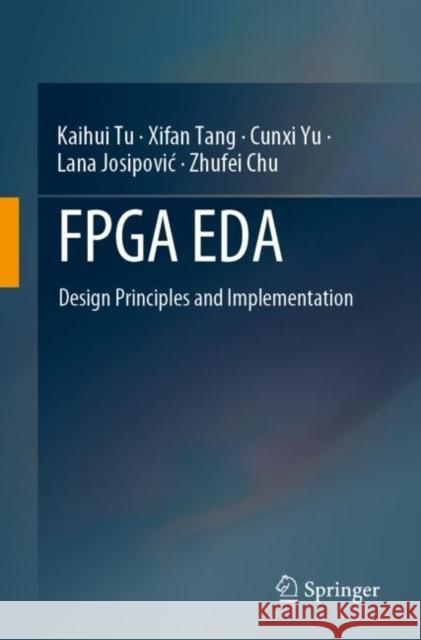FPGA EDA: Design Principles and Implementation » książka



FPGA EDA: Design Principles and Implementation
ISBN-13: 9789819977543 / Angielski
FPGA EDA: Design Principles and Implementation
ISBN-13: 9789819977543 / Angielski
(netto: 211,33 VAT: 5%)
Najniższa cena z 30 dni: 192,74
ok. 16-18 dni roboczych.
Darmowa dostawa!
Part I: Introduction
Chapter1: Introduction
1.1 FPGA Hardware Brief Introduction
1.1.1 FPGA Concept
1.1.2 FPGA Hardware Evolution
1.1.3 FPGA Compares With Other Architectures
1.2 FPGA EDA Brief Introduction
1.2.1 FPGA EDA Concept .
1.2.2 FPGA chip design EDA
1.2.3 FPGA application design EDA
Part II: FPGA Chip Design EDA
Chapter2: Full-custom EDA
Chapter3: Semi-custom EDA
Part III: FPGA Application Design EDA
Chapter4: FPGA Device Modelling
3.1 Device Info Description Level
3.2 Device Info Model Classification
3.3 Device Info Model Instances
3.4 Device Info Data Structure
Chapter5:FPGA Design Modelling
4.1 Design Info Description Level
4.2 Design Info Model Classification
4.3 Design Info Model Instances
4.4 Design Info Data Structure
Chapter6: High Level Synthesis (HLS)
5.1. HLS Concept( Introduction)
5.2. HLS Data Models and General Techniques
5.3. HLS Advanced Techniques
5.3.1 SDC-Based Modulo Scheduling
5.3.2 Dynamic Scheduling
5.3.3 Polyhedral Analysis and Optimization
5.4. Current Status and Future Outlook
5.4.1 Where is HLS Used Today
5.4.2 Comercial HLS Tools
5.4.3 Academic HLS Tools
5.4.4 What Are We Still Missing?
Chapter7: Logic Synthesis (LGS)
6.1 LGS Concept(Introduction)6.2 Boolean Logic Fundamentals
6.2.1 Functional Representations
6.2.2 Directed-Acyclic-Graph(DAG) Boolean Networks
6.2.3 Formal methods
6.3 LGS Data Models and General Techniques
6.3.1 Data Models
6.3.2 Front End
6.3.3 Elaboration
-DAG aware methods
-Exact methods
-Sequential methods
6.3.4 Mapping
-Flow-based methods
-Cut-based methods
-Exact methods
6.3.5 Back End
6.4 LGS Advanced Techniques
6.4.1 Machine Learning
6.4.2 HPC Accelerated
6.5 Current Status and Future Outlook
6.4.2 Comercial LGS Tools
6.4.3 Academic LGS Tools
6.4.4 What Are We Still Missing?
Chapter8: Physical Implementation
7.1 Packing
7.2 Placement
7.3 Routing
7.4 Performance(Timing) Analysis
7.5 Power Analysis
7.6 Area(Resource) Analysis
7.7 Engine Fusion
Chapter9: Bitstream Configuration
8.1 Bitstream Generation
8.2 Bitstream Compression
8.3 Bitstream Encryption
8.4 Device Programming8.5 Partial Reconfiguration
Chapter10: Generic GUI Framework .
Part IV: Summary and Outlook
Chapter11: Summary and Outlook
Kaihui Tu, MSc in Communications, University of York, York, UK. PhD in Microelectronics and Solid State Electronics, University of Chinese Academy of Sciences, Beijing, China. Tu has participated in numbers of Chinese national research projects, including China’s first 10K logic cell FPGA project, first embedded FPGA IP project and first TSV-based 3D FPGA project. With over ten years’ working experience in Chinese Academy of Sciences, Tu was responsible for architecting the eFPGA IP EDA tools that had won the “Made in China research IP Prize” at IP SoC China 2019.
Xifan Tang, PhD in Computer Science, graduated from École Polytechnique Fédérale de Lausanne (EPFL), Lausanne, Switzerland. CTO and cofounder of Rapid-Flex. Tang is also the maintainer of OpenFPGA project.
Cunxi Yu, PhD in Computer Engineering, graduated from University of Massachusetts Amherst, Massachusetts, USA. Currently works as Assistant Professor at University of Maryland, College Park. Dr. Yu was Assistant Professor at University of Utah, and held PostDoc positions at Cornell and EPFL.
Yu’s major academic honor includes: ACM/IEEE Design Automation Conference (DAC 2023) Best Paper Award • American Physics Society LPR Poster Honorable Mention (2022) • NSF CAREER Award (2021) • 2017 ASP-DAC Best Paper Nomination • ACM Doctoral Dissertation Award Nomination (by UMass Amherst) • DAC 2017 Security Contest - 1st Place.
Lana Josipovic currently works as Assistant Professor at ETH Zurich. She got her PhD in Computer and Communication Sciences graduated in 2021 from École Polytechnique Fédérale de Lausanne (EPFL), Lausanne, Switzerland. Dr. Josipovic’s major academic honor includes Best Paper Award Nominee at the 30th Intl. Symposium on Field-Programmable Custom Computing Machines (2022), Fritz Kutter Award for best Swiss industry-related PhD thesis in Computer Science, awarded by ETH Zurich (2021) , and Best Paper Award at the 28th Intl. Symposium on Field Programmable Gate Array (2020).
Lijiang Gao is the FPGA architecture director of Cwise Electronics. He got his PhD in Microelectronics and Solid State Electronics graduated in 2019 from the University of Chinese Academy of Sciences Beijing, China. Dr. Gao has over 15 years of FPGA hardware engineering experience and led the hardware technical work in the first 3D FPGA project in China (2016).
This book focuses on FPGA EDA tools, the very foundation of FPGA technology. Instead of illustrating how to use them, this book dives into the tools themselves, revealing how these tools are being designed and how they may improve. Unlike other semiconductors, FPGA has a distinctive two-stage EDA system: chip design EDA and application design EDA.State-of-the-art algorithms, data models and design methodologies/standards are the main concerns of this book, and these will be very helpful for FPGA EDA engineers and researchers to obtain a bird’s eye view of this complicated knowledge system. In the chip design EDA part, full-custom and semicustom methodologies bring up ASIC-like EDA tools, and in the application design EDA side, typical topics including high-level synthesis, logic synthesis, physical implementation, bitstream configuration, etc., are well discussed.
1997-2026 DolnySlask.com Agencja Internetowa
KrainaKsiazek.PL - Księgarnia Internetowa









